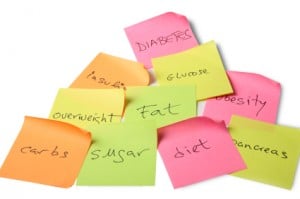 Why Insulin Matters
Why Insulin Matters
High insulin is responsible for perhaps 75-80 percent of all obesity says Robert Lustig, MD in his book, Fat Chance. That’s a strong statement, and if true (which I think it is) means there is hope for the millions of people who struggle with their weight. The reason there is hope is that we can control insulin levels by what we eat, and therefore we have the ability better manage our body weight.
What is Insulin?
Insulin is a hormone produced in the pancreas. It is primarily secreted in response to meals containing carbohydrates. It can also be released in response to anything that tastes sweet (diet soft drinks). One of insulin’s main job is to drive sugar from the bloodstream into cells where it can be used for immediate energy or stored as energy for future use in the form of fat and glycogen.
Insulin is also released when the vagus nerve is stimulated. Leptin is a hormone produced in fat tissue that tells the hypothalamus that there is enough fat calories stored. Normally leptin shuts off appetite, and conversely low leptin is a signal to start eating. However, some people develop leptin resistance and the brain responds to this the same way it responds to low leptin – it stimulates the vagus nerve to stimulate the pancreas to release insulin enabling the body to store calories as fat.
Studies show that insulin suppresses leptin function at the hypothalamus contributing to leptin resistance and creating a vicious downward spiral that leads to more insulin, more leptin resistance, even more insulin and greater leptin resistance, and so on. So insulin blocks leptin signaling leading to weight gain.
Insulin: the Main Fattening Hormone
But, insulin has other roles. It stores calories in fat tissues and when it is elevated those stored calories are “locked up” and unavailable for use. Therefore, insulin is the main fattening hormone of the body.
How much insulin is secreted is determined by the glycemic load of a meal which takes into account how much carbohydrate is in a meal and how readily digestible it is and absorbed into the bloodstream. High glycemic meals cause large spikes in insulin secretion. Low glycemic meals trigger smaller releases of insulin.
Eat too many high glycemic meals and guess what? You will gain weight. Eat low glycemic meals and keep insulin levels low and you will lose weight. Now, weight loss is more complicated than simply controlling insulin, and our cravings for foods and our sense of satiety are also key factors. Yet, controlling insulin is the first step towards meaningful weight loss.
Another problem with high glycemic foods (including soft drinks) is many times they do not provide a sense of fullness so we tend to overeat. Also, a rapid spike in insulin levels leads to a sudden lowering of blood sugar. This stimulates the appetite. How do we respond to this sudden drop in blood sugar? We eat. We eat to provide an immediate source of energy to the body.
So the net effect of high insulin is 1) calories stored in fat are unavailable to be burned, 2) a rapid lowering of blood sugar that leads to overeating, and 3) leptin resistance. All of this creates the perfect environment weight gain.
Keep Insulin Levels Low and Lose Weight
To lose weight keep insulin levels low by eating healthier. Eat low glycemic carbohydrates. These naturally contain fiber that delays absorption of sugar and diminishes insulin level. Especially avoid simple sugars by avoiding processed foods (anything in a bag, box, can or jar) which are high in added sugars. Also, avoid/limit white starchy carbs like pasta, bread, rice, and potatoes.
Eat your carbs with sources of healthy fats and proteins. This will also lead to lower insulin levels – do not eat carbs by themself. Improve your eating in this way and you will see body fat being shed.

Excellent article. I absolutely concur!
Thanks, Dr.Mayer!